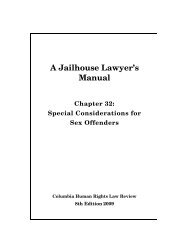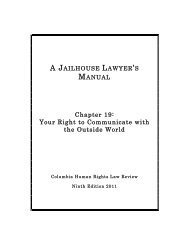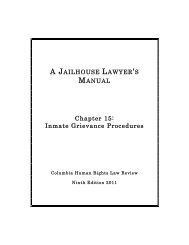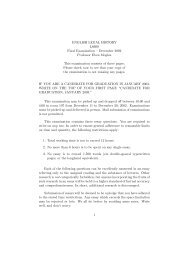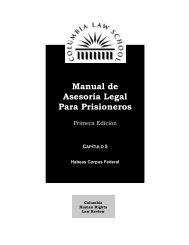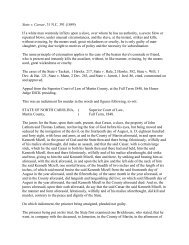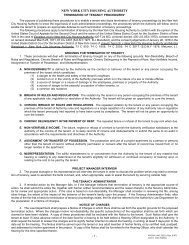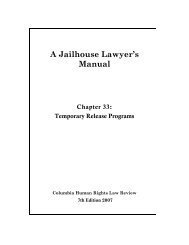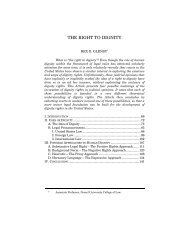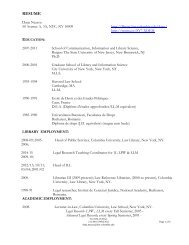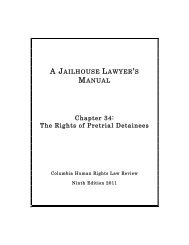A Right to Media? Lorie M. Graham - Columbia Law School
A Right to Media? Lorie M. Graham - Columbia Law School
A Right to Media? Lorie M. Graham - Columbia Law School
Create successful ePaper yourself
Turn your PDF publications into a flip-book with our unique Google optimized e-Paper software.
2010] A RIGHT TO MEDIA? 449<br />
communities in particular are given a forum for discussion and<br />
expression. 74<br />
UNESCO has also addressed the scope of rights surrounding<br />
media. 75 For instance, at its 1978 General Conference, UNESCO<br />
created a resolution that endorsed freedom of the press and stressed<br />
the need “for the establishment of a new equilibrium and greater<br />
reciprocity in the flow of information . . . for a free flow and wider and<br />
more balanced dissemination of information.” 76 This resolution,<br />
entitled the Declaration on Fundamental Principles concerning the<br />
Contribution of the Mass <strong>Media</strong> <strong>to</strong> Strengthening Peace and<br />
International Understanding, <strong>to</strong> the Promotion of Human <strong>Right</strong>s and<br />
<strong>to</strong> Countering Racialism, Apartheid and Incitement <strong>to</strong> War, led <strong>to</strong> the<br />
formation of the McBride Commission. 77 Among other things, this<br />
commission attempted <strong>to</strong> create specific solutions <strong>to</strong> combat media<br />
imbalance perceived by third world nations. 78 In its 1980 Report, the<br />
Commission dealt with these international communication issues<br />
and insisted that “all those working in mass media should contribute<br />
<strong>to</strong> the fulfillment of human rights, both individual and collective.” 79<br />
74. UNICEF, Working with Indigenous Children on their <strong>Right</strong>s,<br />
http://www.unicef.org/voy/takeaction/takeaction_3813.html (last visited Feb. 5,<br />
2010).<br />
75. See generally UNESCO, www.unesco.org (last visited Feb. 5, 2010) (The<br />
website’s Communication and Information section, for example, contains<br />
information about “empowering people through the free flow of ideas by word and<br />
image, and by access <strong>to</strong> information and knowledge.”).<br />
76. Declaration on Fundamental Principles Concerning the Contribution of<br />
the Mass <strong>Media</strong> <strong>to</strong> Strengthening Peace and International Understanding, <strong>to</strong> the<br />
Promotion of Human <strong>Right</strong>s and <strong>to</strong> Countering Racialism, Apartheid, and<br />
Incitement <strong>to</strong> War, UNESCO Res. 4/9.3/2, arts. 6–10, (1978).<br />
77. The McBride Commission was named for its chairman, Sean McBride,<br />
who later founded Amnesty International. See John Daly, UNESCO, The<br />
McBride Commission and Its Findings, http://unescoscience.blogspot.com/<br />
2006/03/mcbride-commission-and-its-findings.html (March 12, 2006).<br />
78. David A. Cifrino, Press Freedom in Latin America and the Emerging<br />
International <strong>Right</strong> <strong>to</strong> Communicate, 9 B.C. Third World L.J. 117, 122 (1989).<br />
79. The MacBride Comm’n, Int’l Comm’n for the Study of Comm. Probs.,<br />
Many Voices, One World 40 (1980). The United States withdrew from UNESCO<br />
during the Regan Administration because of beliefs on the part of policymakers<br />
that UNESCO’s policies might impede the free flow of information. See Letter<br />
from George Schultz, Sec’y of State, <strong>to</strong> Amadou-Mahtar M’Bow, Direc<strong>to</strong>r-General<br />
of UNESCO (Dec. 28, 1983), reprinted in U.S. Dep’t of State, American Foreign<br />
Policy Current Documents, Document 93, at 282–83 (1983). These concerns, as<br />
they relate <strong>to</strong> Article 16, are addressed more fully below.



